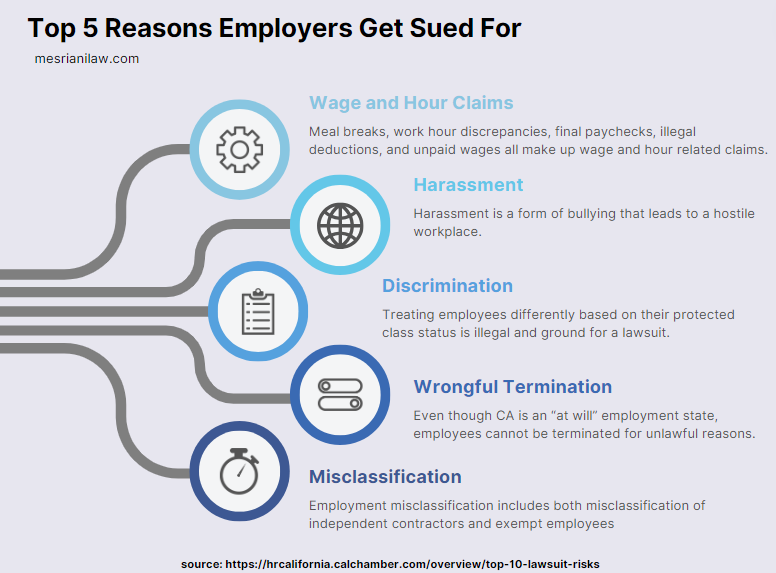Thanks to some of the strongest labor laws in the United States, employees in California enjoy a wide array of rights and protections in the workplace. These laws prohibit employers from engaging in actions like discriminatory practices, retaliating against employees, violating wage and hour laws, and more. When these rights are infringed upon, employees have the legal standing to hold their employers accountable through litigation.
Deciding to sue your employer is a significant step that requires courage, determination, and a solid understanding of your rights. It also helps to have the right legal team to support you. Violations of your workplace rights are not only unacceptable but can also have severe financial and emotional repercussions. This article aims to explore the various reasons you might consider suing your employer and help guide you through the legal grounds and processes involved in seeking justice and compensation for any harm or losses you have experienced.
If your employment rights have been violated, call us today at (866) 936 7349 to schedule a free consultation
Reasons to Sue Your Employer in California
You have grounds for a lawsuit against your employer if they violate any California law that applies to the workplace. Employees often file lawsuits due to illegal actions taken by employers, whether out of ignorance or deliberate disregard for employee rights. These violations typically fall under several common categories which will be discussed in the following sections.

Wrongful Termination
Most employees in California are considered “at-will,” meaning they can leave their job at any time and employers can terminate their employment without providing a reason. However, this does not give employers the right to fire employees for any reason. Wrongful termination occurs when an employer fires an employee for illegal or unethical reasons like discrimination, retaliation, or breach of contract.
Under California law, wrongful termination [1] includes firing an employee for engaging in protected activities. These activities include complaining about or reporting workplace harassment or discrimination, requesting reasonable accommodations for disabilities or religious beliefs, and whistleblowing on illegal practices. Additionally, employees cannot be terminated for serving jury duty, voting, or taking leave under the Family and Medical Leave Act. Employees who believe they have been wrongfully terminated have the right to file a lawsuit against their employer to seek justice and compensation.
Discrimination
Discrimination in the workplace is prohibited under the California Fair Employment and Housing Act (FEHA) and federal laws such as Title VII of the Civil Rights Act [2] and the Americans with Disabilities Act (ADA). FEHA specifically outlaws discrimination based on various protected characteristics. These protected classes include:
- Age
- Disability
- Ethnicity
- Gender
- Sex
- Sexual Orientation
- Race
- Pregnancy
- Military Status
- National Origin
- Religion
- Domestic Violence Victims
This protection extends throughout the entire employment process, from pre-employment interviews to ongoing employment and termination.
An employer can be held liable if they treat employees differently based on any protected class. Common discrimination claims include age discrimination, racial discrimination, disability discrimination, religious discrimination, and pregnancy discrimination. If you believe you have been discriminated against at work due to any of these protected characteristics, you have the right to file a lawsuit against your employer to seek justice and compensation.
Wage and Hour Violations
California law outlines specific requirements for how and when employers must pay their employees. Known as “wage and hour” laws, these regulations ensure fair compensation for workers. Employers who violate these laws can be sued by their employees. Common wage and hour violations include:
- Failing to Pay Minimum Wage: Not paying the state-mandated minimum wage of $16.00 per hour, effective Jan 1, 2024 [3].
- Failing to Pay Overtime Pay: Not paying 1.5 times the regular rate for hours worked over eight in a day and double the rate for hours worked over twelve hours in a day. Overtime also extends the 1.5 times rate to anytime worked over 40 hours per week [4].
- Failing to Provide Lunch and Rest Breaks: Not giving mandated meal and rest breaks during shifts.
- Failing to Provide Workers’ Compensation Insurance: Not offering insurance to cover work-related injuries.
- Wage Theft: Not paying employees for all hours worked including unpaid wages, commissions, or bonuses.
Employees who face these violations have the right to file a lawsuit against their employer to recover lost wages and other damages.
Employee Misclassification
Employee misclassification occurs when employers incorrectly label their employees as independent contractors or exempt employees to circumvent labor laws and avoid paying benefits, overtime, and workers’ compensation. This practice is not only unethical but also illegal under California law. Employers may misclassify workers to reduce labor costs, but this deprives employees of crucial protections and benefits they are entitled to.
Common forms of misclassification include labeling a regular employee as an independent contractor while expecting them to perform duties akin to an employee or classifying employees as exempt to avoid paying overtime. Misclassification can have significant financial and legal implications for workers, including loss of overtime pay, health benefits, and job security. If you believe you have been misclassified, it is essential to know your rights and take legal action to ensure fair treatment and compensation.
Harassment
Workplace harassment encompasses various forms including sexual harassment, racial harassment, and other discriminatory behaviors that contribute to a hostile work environment. California law provides robust protections for employees against such unlawful harassment. If an employer is aware of the harassment and fails to take corrective action, they can be sued for creating or perpetuating a hostile work environment. This applies to all forms of harassment including those based on race, gender, age, religion, or any other protected characteristic. Employees have the right to work in an environment free from harassment and can seek legal recourse if these rights are violated.
Sexual Harassment
Sexual harassment in the workplace is a serious issue that infringes on the rights and well-being of employees. Both federal and California laws provide vital protections against sexual harassment to ensure that individuals who encounter or witness such behavior can seek justice. Sexual harassment can take various forms, all of which contribute to a hostile work environment and should never be tolerated.
Types of sexual harassment include:
- Unwelcome Sexual Advances: Inappropriate actions or comments that create discomfort or fear.
- Requests for Sexual Favors (quid quo pro) [6]: Pressuring employees for sexual acts in exchange for job security, promotions, or other workplace benefits.
- Physical Sexual Contact: Unwanted touching, groping, or any form of physical assault.
- Verbal/Visual Conduct: Offensive comments, jokes, or the display of explicit materials that contribute to a hostile work environment.
Employees subjected to any form of sexual harassment have the right to work in an environment free from such misconduct and can take legal action to hold perpetrators accountable.
Hostile Work Environment / Retaliation
A hostile work environment and retaliation are significant issues addressed by California law. Employees are legally protected from retaliation when they report unlawful activities like discrimination or other illegal practices. Retaliation can take many forms including blacklisting, demotion, intimidation, unfair discipline, pay reduction, denial of benefits or overtime, and failure to hire or promote. These actions create a hostile work environment which makes it difficult for employees to perform their duties effectively.
California’s Whistleblower Protection Act (WPA) [5] further safeguards employees who report illegal activities (whistleblowers) from retaliation. Employers are prohibited from taking adverse actions against employees who exercise their rights by bringing complaints or grievances in good faith. If an employee experiences retaliation after reporting unlawful behavior, they have the right to file a lawsuit against their employer. Such protections are essential to maintaining a fair and just workplace where employees can speak out against wrongdoing without fear of retribution.
Illegal Interview Questions
During the hiring process, employers are prohibited from asking discriminatory questions that could be used to unfairly exclude candidates. Under both federal and California laws, employers cannot inquire about personal information that is protected under anti-discrimination laws. This includes questions about pregnancy plans or status, health conditions, disabilities, ethnic backgrounds, religion, and sexual orientation.
Despite these legal protections, some employers may still attempt to gather this information indirectly by asking vague or seemingly innocuous questions. For example, an employer might ask a candidate how they spend their free time in an attempt to elicit information about their religious practices or family plans. Such tactics are also considered illegal and unethical. It is important for job applicants to be aware of their rights and to recognize when they are being asked inappropriate questions during an interview. If faced with such questions, applicants have the right to decline to answer and can report the incident to appropriate authorities.
FMLA and CFRA Violations
Violations of the Family and Medical Leave Act (FMLA) and the California Family Rights Act (CFRA) are serious matters that can significantly impact employees’ lives. The FMLA is a federal law that grants eligible employees up to 12 weeks of unpaid leave per year for certain family and medical reasons including the birth of a child, serious health conditions, or caring for a family member with a serious health condition. Similarly, the CFRA provides additional protections for employees in California that offer up to 12 weeks of unpaid leave for similar reasons.
Employers are required to comply with both FMLA and CFRA regulations to ensure that employees can take necessary leave without fear of losing their jobs or facing retaliation. If an employer denies an eligible employee their rightful leave, fails to maintain their health benefits during leave, or retaliates against them for taking leave, then the employee can file a lawsuit for these violations. These laws are designed to provide crucial support and flexibility for employees during significant life events and health crises and violations can lead to significant legal consequences for employers.
Failure to Accommodate Disabilities and Religious Needs
Employers are legally obligated to provide reasonable accommodations for employees with disabilities and for those with sincerely held religious beliefs. Under the Americans with Disabilities Act (ADA) and the California Fair Employment and Housing Act (FEHA), employers must make adjustments or modifications to the work environment that enable employees with disabilities to perform their job duties. This can include modifying work schedules, providing assistive devices, or altering the physical workspace. Failure to provide accommodations within reason can result in legal action against the employer for discrimination.
Similarly, employers must accommodate employees’ religious beliefs and practices unless it causes undue hardship to the business. This might include flexible scheduling for religious observances, allowing religious attire or grooming, or providing a space for prayer. When an employer fails to make these reasonable accommodations, it constitutes a violation of the employee’s rights. Employees facing such discrimination can file a lawsuit to seek remedies and ensure that their rights are protected in the workplace.
Breach of Contract
A breach of contract occurs when an employer fails to adhere to the terms and conditions outlined in an employment agreement. In California, every employer-employee relationship is technically an employment contract, but many are formally written to provide a clear outline of job expectations, disciplinary actions, wages and payment, working conditions, and terms of termination and severance. When an employer fails to honor any of these stipulated conditions, it is considered a breach of contract.
For example, if an employer does not provide the benefits promised in the contract, withholds wages, or fails to adhere to agreed-upon working conditions, then the employee has the right to file a lawsuit for breach of contract. Such violations can have significant financial and professional impacts on employees and legal recourse is available to ensure that the terms of employment are respected and enforced. By holding employers accountable, employees can seek compensation for any damages incurred due to the breach.
Violating Employee Privacy
California law provides several protections for employee privacy that cover a range of workplace scenarios. Employers must respect these privacy rights to avoid legal consequences. Common areas where employee privacy might be violated include:
- Videotaping in the Workplace: Whether and how employers can use surveillance cameras in the workplace.
- Monitoring Internet Usage: Employers’ ability to monitor employees’ internet activity and communications.
- Criminal Records: Asking about job applicants’ criminal records and the limits on such inquiries.
- Medical Records and History: How employers can use and protect employees’ medical records and history.
- Drug Testing: Policies and procedures for drug testing employees and job applicants.
- Credit Rating Checks: Whether an employer can check an employee’s or applicant’s credit rating.
- Social Security Number Use: How employers use and protect employees’ Social Security Numbers.
- Employee Video Recordings: The right of employees to make video recordings of occurrences in the workplace.
Violations of these privacy rights can lead to significant legal issues for employers. Employees who believe their privacy has been breached can file a lawsuit to seek damages and ensure their rights are protected.
Defamation
Defamation in the workplace occurs when an employer or co-worker makes false statements about an employee that harm their reputation. This can include both written defamation (libel) and spoken defamation (slander). Such false statements can damage an employee’s professional standing, hinder future job prospects, and cause emotional distress. If an employee can prove that false allegations were made with malicious intent and resulted in harm, they may have grounds to file a lawsuit for defamation against their employer or the individual responsible.
Workplace Injury
Employees who suffer workplace injuries are entitled to workers’ compensation benefits, regardless of whether their actions contributed to the injury. Workers’ compensation is designed to cover medical expenses, lost wages, and rehabilitation costs associated with workplace injuries. If an employer refuses to provide these benefits, the employee should contact a lawyer to start a claim and ensure they receive the compensation they deserve.
If your employment rights have been violated, call us today at (866) 936 7349 to schedule a free consultation
Can I Sue My Employer for Setting Me Up to Fail?
Suing an employer for “setting an employee up to fail” gets a little more complex because failure to provide adequate training or resources isn’t necessarily grounds to sue your employer. For there to be a legitimate reason to sue, it would require that there be a direct violation of employment laws that guided the decision to provide inadequate training and resources. One example of this would be if the reason behind poor training involved discrimination, retaliation, or harassment. In these cases, the argument that poor training was intentionally provided would have to be made to show either discrimination, bullying, or the existence of a hostile workplace.
You can also potentially sue your employer for setting you up to fail if it involves false promises or fraudulent inducement. Fraudulent inducement [7] occurs when an employer makes misleading verbal statements or promises to entice an employee into a position, knowing they cannot or will not follow through. Examples include promises of bonuses, promotions, or significant project leadership that never materialize. These false promises can lead to claims of negligent misrepresentation or fraudulent inducement under California law, which protects employees from deceitful practices. If an employee accepts a job or remains in their position based on such false promises, they may have grounds for legal action to seek compensation for damages. Consulting with a qualified employment lawyer is essential to assess the specifics of the situation and determine the best course of action.
Can I Sue My Employer for Unfair Treatment?
You can potentially sue your employer for unfair treatment, but it depends on the nature of the unfairness and whether it violates specific employment laws. Unfair treatment that constitutes discrimination based on race, gender, religion, national origin, or other protected characteristics is illegal and can be grounds to sue your employer. Additionally, if unfair treatment involves retaliation for reporting illegal activities or exercising legal rights like taking medical leave, you may have a valid claim. It’s important to note that not all forms of unfair treatment are actionable. For example, favoritism or unequal enforcement of rules, unless linked to discrimination or retaliation, does not constitute a legal claim.
Can I Sue My Employer for Emotional Distress?
Employees can sue their employer for emotional distress if certain conditions are met. Emotional distress occurs when someone else’s actions cause anxiety, depression, humiliation, and stress to the extent that it negatively impacts the victim’s daily life. There are two types of emotional distress that could provide grounds for legal action:
- Negligent Infliction of Emotional Distress (NIED): This occurs when an employer’s negligence or willful dereliction of duty directly results in their employee suffering emotional distress. For instance, if an employer fails to address a hostile work environment which leads to significant emotional harm to an employee, this could be considered negligent infliction of emotional distress.
- Intentional Infliction of Emotional Distress (IIED): This occurs when an employer deliberately or recklessly engages in conduct that is extreme and outrageous, causing their employee severe emotional distress. Examples include persistent harassment, threats, or other abusive behaviors that are beyond the bounds of decency.
Employees experiencing emotional distress due to their employer’s actions should consult with a legal professional to assess their situation and determine the best course of action.
Can I Sue My Employer for the Actions of an Employee?
You can sue your employer for the actions of another employee if certain conditions are met. Employers have a legal obligation to provide a safe and non-discriminatory work environment. This includes taking appropriate action when employees engage in harmful behaviors such as harassment and discrimination. An employee may have grounds to take legal action against their employer for a coworker’s conduct if the following conditions are satisfied:
- Employer Knowledge: The employer knew about the harmful behavior or reasonably should have known.
- Employee Harm: The employer was aware that the employee was suffering harm due to the behavior.
- Failure to Act: The employer refused or failed to take appropriate action to stop the harmful behavior.
It is crucial for employees facing workplace discrimination or harassment to document incidents and make detailed written complaints to their human resources department or equivalent. This documentation can provide essential evidence if legal action becomes necessary. By holding employers accountable, employees can seek justice and promote a safer work environment.
Can I Sue My Employer If I Resign?
You can sue your employer if you resign under certain circumstances. If your employer created a work environment so hostile and intolerable that you felt you had no choice but to resign, you may have grounds to file a lawsuit under the theory of “constructive termination.” This legal concept treats your resignation as a termination because the employer’s conduct effectively forced you to quit.
California law protects employees who resign due to unbearable working conditions. If you can demonstrate that the work environment was so hostile or discriminatory that any reasonable person in your position would have felt compelled to resign, you may have a case for constructive termination. This ensures that employers cannot escape liability for creating intolerable conditions that push employees to leave voluntarily. If you believe you have been constructively terminated, it is important to consult with an employment attorney to explore your legal options and seek justice for the wrongful treatment you endured.
Reasons Not to Sue Your Employer
While pursuing legal action against your employer can be a valid option in certain situations, there are also circumstances where it might not be the best course of action. Here are some reasons you might reconsider suing your employer:
- Lack of Valid Legal Claim: If you do not have a strong legal basis for your case, it may be challenging to win in court. Consulting with an attorney can help you assess the strength of your claim before proceeding. Without a solid foundation, the lawsuit might not yield the desired outcome and could result in unnecessary expenses.
- Alternative Dispute Resolution: Exploring alternative ways to resolve issues like mediation or arbitration can be quicker and less adversarial than litigation. These methods often result in mutually agreeable solutions and can preserve professional relationships. They also tend to be less time-consuming and costly compared to a court battle.
- Statute of Limitations: Some claims have strict deadlines for filing lawsuits. If you wait too long, you may lose the opportunity to sue. It’s crucial to understand the time limits associated with your specific legal claims and act promptly to avoid missing critical deadlines.
- Personal Considerations: Evaluate your personal circumstances including your health, family, and financial situation before deciding to pursue legal action. Litigation can be stressful, time-consuming, and can impact your well-being and daily life. Weighing these factors can help you determine if pursuing a lawsuit is in your best interest.
Ultimately, the decision to sue your employer should be made after careful consideration of these factors and consultation with legal experts to ensure it aligns with your best interests.
If your employment rights have been violated, call us today at (866) 936 7349 to schedule a free consultation
How Do I Sue My Employer?
Taking legal action also requires careful preparation and a clear understanding of the process. This typically involves documenting the issue, reporting it to your employer, and consulting with an experienced employment lawyer who can guide you through filing a complaint with the appropriate government agency and, if necessary, proceeding to court. Always consult with a qualified employment attorney for personalized advice based on your specific situation.

Step 1: Understand Your Rights
Understanding your rights is the crucial first step when considering legal action against your employer. California employment laws offer extensive protections for workers including safeguards against discrimination, harassment, retaliation, wage and hour violations, and wrongful termination. Begin by researching the specific laws that apply to your situation to ensure you are fully informed about your legal rights and the protections available to you. This foundational knowledge will empower you to take the appropriate steps to address any violations and seek justice effectively. Consulting with a knowledgeable employment attorney can also provide clarity and guidance tailored to your unique circumstances.
Step 2: Document the Issue
Documenting the issue is a critical step in building a strong case against your employer. Keep a detailed record of all relevant incidents including inappropriate comments, emails, disciplinary actions, changes in job duties, pay stubs, and any other pertinent information. This comprehensive documentation will serve as crucial evidence if you decide to file a lawsuit which will help to substantiate your claims and provide a clear timeline of events. Meticulous record-keeping can significantly strengthen your case and enhance your chances of achieving a favorable outcome.
Step 3: Report the Issue to Your Employer
Before filing a lawsuit, it’s essential to report the issue to your employer or HR department. This step allows the employer an opportunity to address and potentially resolve the problem internally. Ensure that you document all communications and reports made to your employer including dates, times, and the responses received. Keeping a thorough record of these interactions not only demonstrates that you attempted to resolve the issue through the appropriate channels but also provides additional evidence should the matter escalate to legal action.
Step 4: Consult an Employment Lawyer
Given the complexity of employment law, it is generally advisable to consult with an experienced employment attorney by this point if you haven’t already. An attorney can help you understand your rights, assess the strength of your case, and guide you through the legal process. They can provide invaluable advice, help you gather necessary evidence, and represent your interests in negotiations or court proceedings. Having a knowledgeable advocate on your side can significantly enhance your chances of a favorable outcome and ensure that your case is handled with the expertise it requires.
Step 5: File a Complaint with the Appropriate Government Enforcing Agency
Depending on the nature of your claim, you may be required to file a complaint with a relevant government agency before proceeding with a lawsuit. For discrimination, harassment, and retaliation claims, it is typically necessary to file a complaint with the California Department of Fair Employment and Housing (DFEH) or the federal Equal Employment Opportunity Commission (EEOC). These agencies will investigate your complaint and, if warranted, issue a “right to sue” notice [8], which allows you to file a lawsuit in court.
For wage and hour disputes, you may need to file a wage claim with the California Division of Labor Standards Enforcement (DLSE). This agency handles complaints related to unpaid wages, overtime, and other wage-related issues. Filing with the appropriate agency ensures that your claim is properly documented and gives the employer an opportunity to address the issue through administrative channels before escalating to litigation.
Step 6: Obtain a “Right to Sue” Notice
If you file a complaint with the California Department of Fair Employment and Housing (DFEH) or the Equal Employment Opportunity Commission (EEOC) and they decide not to take action, you will receive a “right to sue” notice. This document is essential as it grants you legal permission to proceed with filing a lawsuit in court. It is crucial to be aware of the specific deadlines associated with this notice, as you must file your lawsuit within a certain timeframe after receiving it to ensure your case is considered valid and timely.
Step 7: File a Lawsuit
Your attorney will prepare a legal document called a complaint, which details your claims against your employer and the legal basis for your lawsuit. This complaint is then filed in the appropriate California court. Once the lawsuit is filed, the legal process will commence including discovery which is the formal process of exchanging information pertinent to the case, potential settlement discussions, and possibly a trial if a settlement cannot be reached. This step is critical as it officially initiates the legal proceedings and sets the stage for resolving your claims through the court system.
Step 8: Go to Trial
If your case is not settled through negotiations, it will proceed to trial. During the trial, you will likely need to testify so your account of the events is recorded under oath. Your attorney will present evidence, call witnesses, and make arguments to support your case. The judge or jury will then evaluate the evidence and testimonies to determine whether your employer violated the law. If they agree your rights were violated, they will decide the amount of damages you should receive. This step is critical as it is the culmination of the legal process where the final decision will be made regarding your claims against your employer.
If your employment rights have been violated, call us today at (866) 936 7349 to schedule a free consultation
Considerations Before Moving Forward with a Lawsuit Against Your Employer
Before filing a lawsuit against your employer, there are several critical considerations to keep in mind:
- Be Sure There Was a Suable Offense: Ensure that your claim involves a legal violation like discrimination or retaliation, rather than general workplace grievances. Employers are not legally obligated to provide a positive work environment if their actions do not violate specific laws.
- Check to See if Anyone Else’s Employment Rights are Being Violated: Look for patterns of behavior affecting other employees. If others in your demographic or those who engaged in similar protected activities have faced similar mistreatment, this can strengthen your case by showing a pattern of discrimination or retaliation. There may even be enough evidence to support a class action claim against your employer.
- Be Prepared to Be Scrutinized: Understand that your employer will likely defend their actions by scrutinizing your performance and behavior. Be prepared for your work history, adherence to company policies, and any past disciplinary issues to be examined and potentially used against you.
- Be Prepared to Work in an Uncomfortable Situation at Work: If you are still employed, pursuing legal action can create workplace tension and affect your daily working conditions. Consider the potential impact on your work environment and weigh this against the benefits of proceeding with your claim.
- Determine What Your Desired Outcome of the Lawsuit Is: Clearly define your goals for the lawsuit, whether it’s compensation for lost wages, damages for emotional distress, or holding your employer accountable for their actions. Understanding your desired outcome can help you stay focused and make informed decisions throughout the legal process.
- Accept the Risk That the Outcome of the Lawsuit May Be Nothing: Litigation can be unpredictable, and even with strong evidence, there is no guarantee of success. Be prepared for the possibility of losing your case and consider whether negotiating a settlement might be a more practical and less risky option.
How to Prove a Violation of Employment Rights
Proving a violation of employment rights requires meticulous documentation and a clear presentation of evidence. Start by keeping detailed records of all incidents related to the violation including dates, times, locations, and the names of individuals involved. Collect any relevant documents like emails, written communications, performance reviews, pay stubs, and company policies. Witness statements from colleagues who have observed discriminatory or retaliatory behavior can also be invaluable.
Additionally, consulting with an experienced employment law attorney is crucial. An attorney can help you organize your evidence, provide legal guidance, and represent your interests throughout the legal process. They will ensure that your claim is presented effectively and that you are aware of all legal requirements and deadlines. Proper documentation and expert legal support are key to successfully proving a violation of your employment rights and achieving a favorable outcome in your case.
Contact Mesriani Law Group if Your Employment Rights Have Been Violated
If you believe your employment rights have been violated, it’s important to seek legal assistance to ensure justice is served. The dedicated team at Mesriani Law Group is here to support you. With extensive experience in employment law, our attorneys are committed to protecting your rights and securing the compensation you deserve. Don’t let unlawful actions by your employer go unchecked. Contact Mesriani Law Group today for a free consultation and let us help you navigate the legal process to achieve the best possible outcome for your case.
Sources
[1] https://www.usa.gov/wrongful-termination [2] https://www.eeoc.gov/statutes/title-vii-civil-rights-act-1964 [3] https://www.dir.ca.gov/dlse/minimum_wage.htm [4] https://www.dir.ca.gov/dlse/faq_overtime.htm [5] https://www.dir.ca.gov/dlse/whistleblowersnotice.pdf [6] https://calcivilrights.ca.gov/wp-content/uploads/sites/32/2020/03/Sexual-Harassment-Fact-Sheet_ENG.pdf [7] https://codes.findlaw.com/ca/civil-code/civ-sect-1710/ [8] https://calcivilrights.ca.gov/wp-content/uploads/sites/32/2023/01/CRD-Intake-Form_Right-to-Sue_ENG.pdf
Sue Your Employer FAQs
How long do you have to sue an employer in California?
In California, the statute of limitations for suing an employer depends on the type of claim. For discrimination, harassment, or retaliation claims you typically have three years from the date of the incident to file a complaint with the California Department of Fair Employment and Housing (DFEH). For wage and hour violations, you generally have three years from the date of the violation to file a claim.
Should I quit my job if I'm suing them?
Deciding whether to quit your job while suing your employer depends on your specific situation. It's generally advisable to consult with an employment attorney before making this decision as quitting might impact your case or potential settlement. However, if the work environment is intolerable or poses a risk to your well-being, leaving may be necessary. However, be sure you document the reasons for your resignation thoroughly just in case there is a valid constructive termination claim.
Can you sue a company after 3 years?
Whether you can sue a company after 3 years depends on the type of claim and the applicable statute of limitations. For example, many employment law violations in California typically have a three-year statute of limitations, so you can still sue within that period but not after that period expires.








